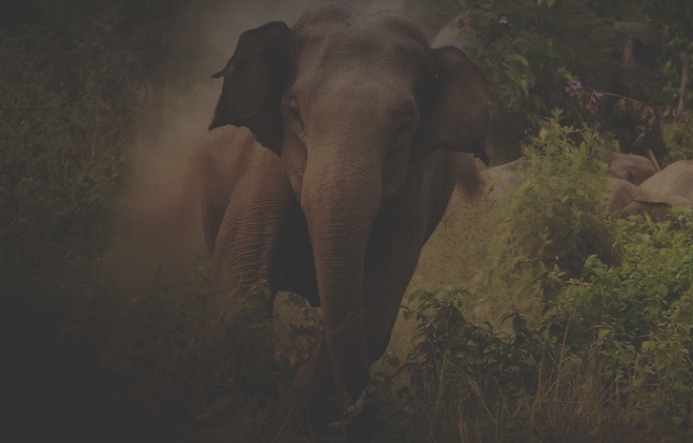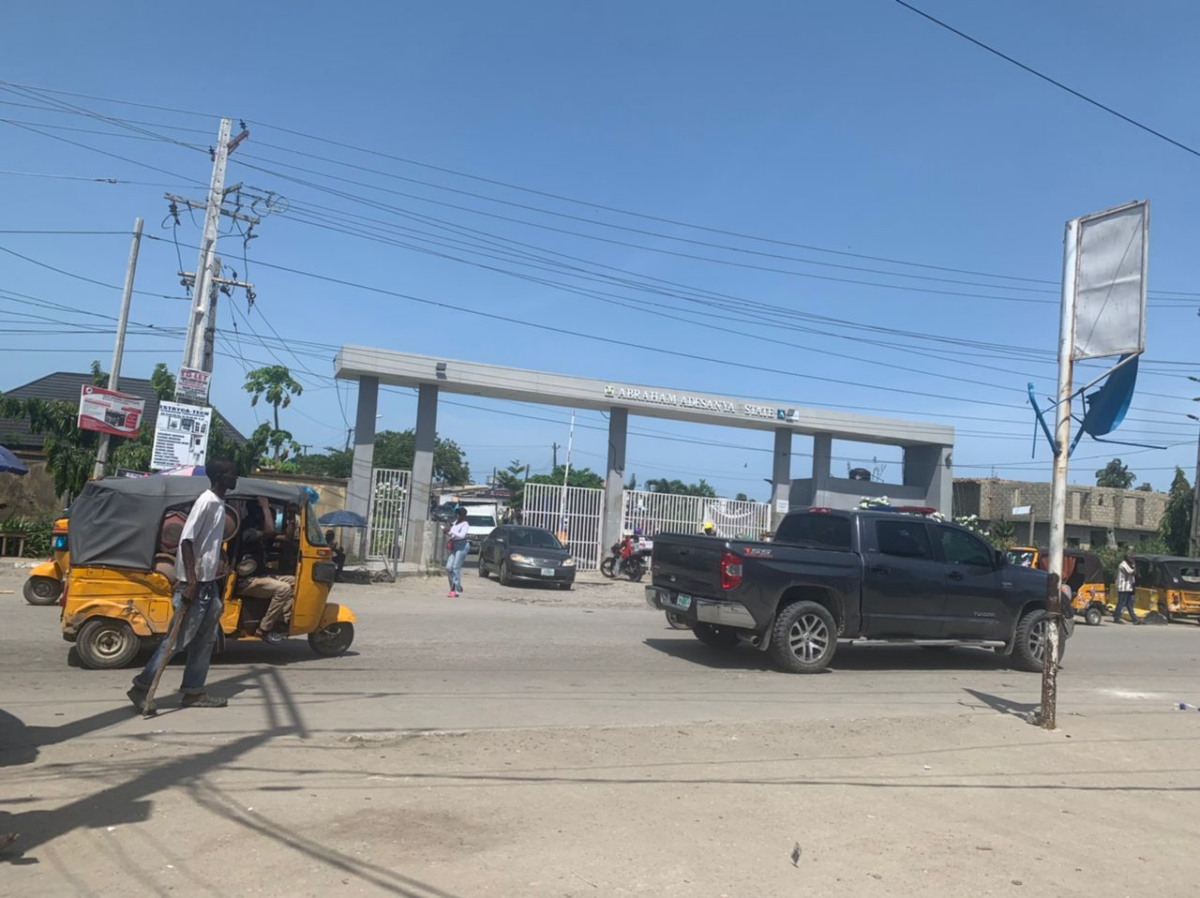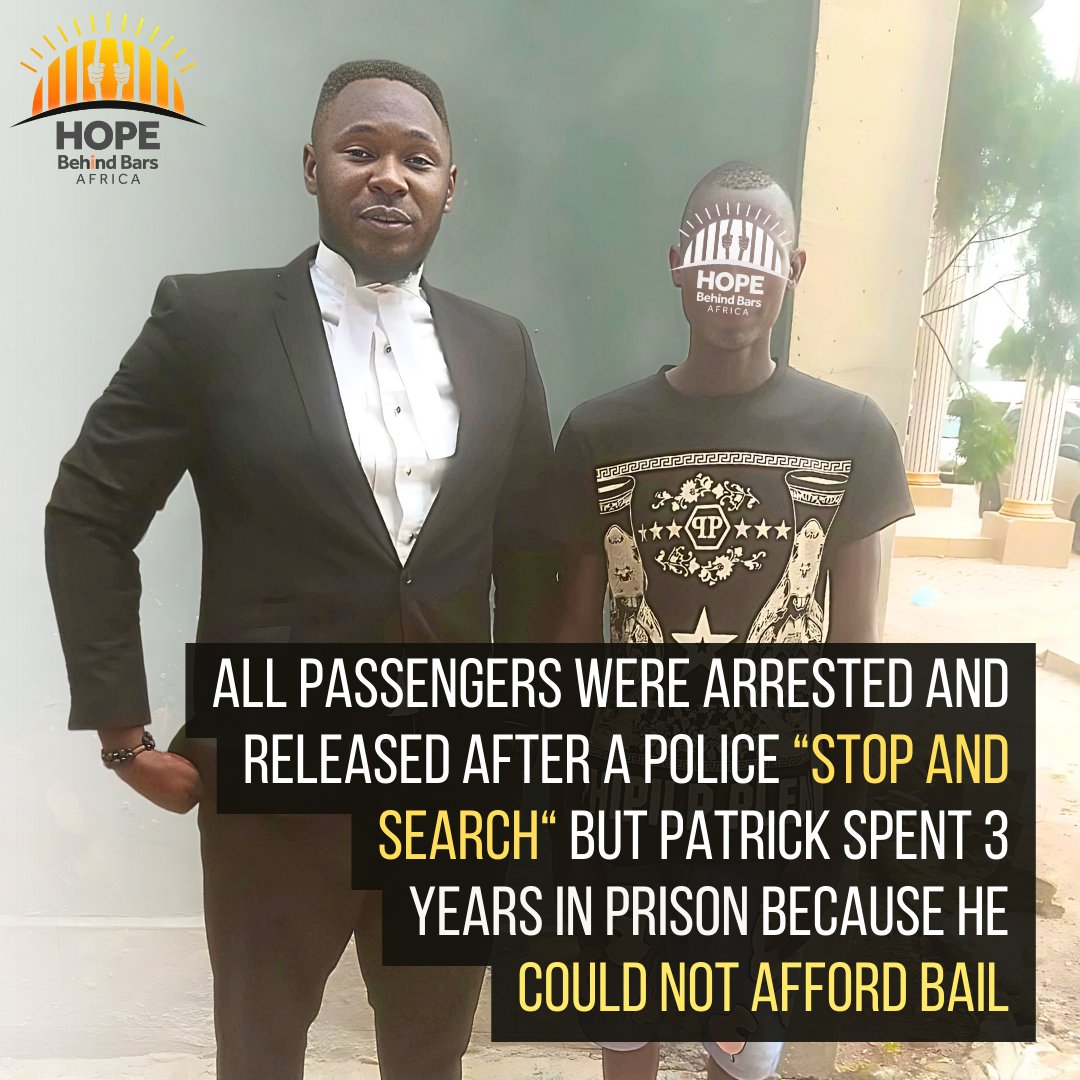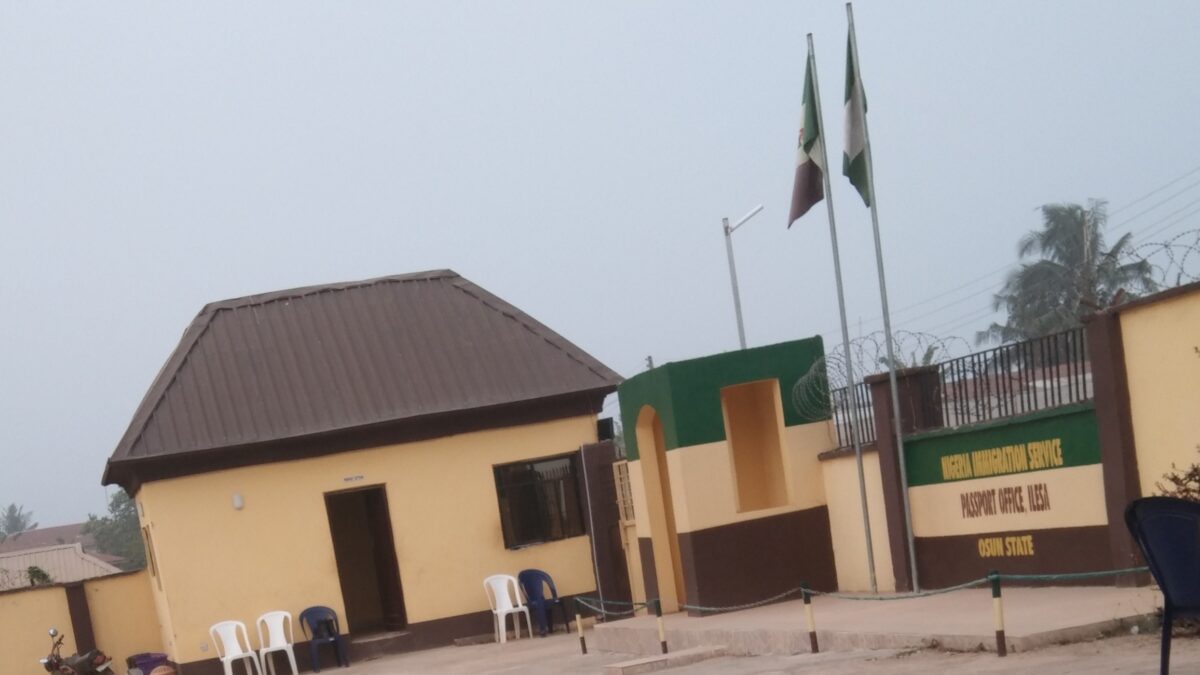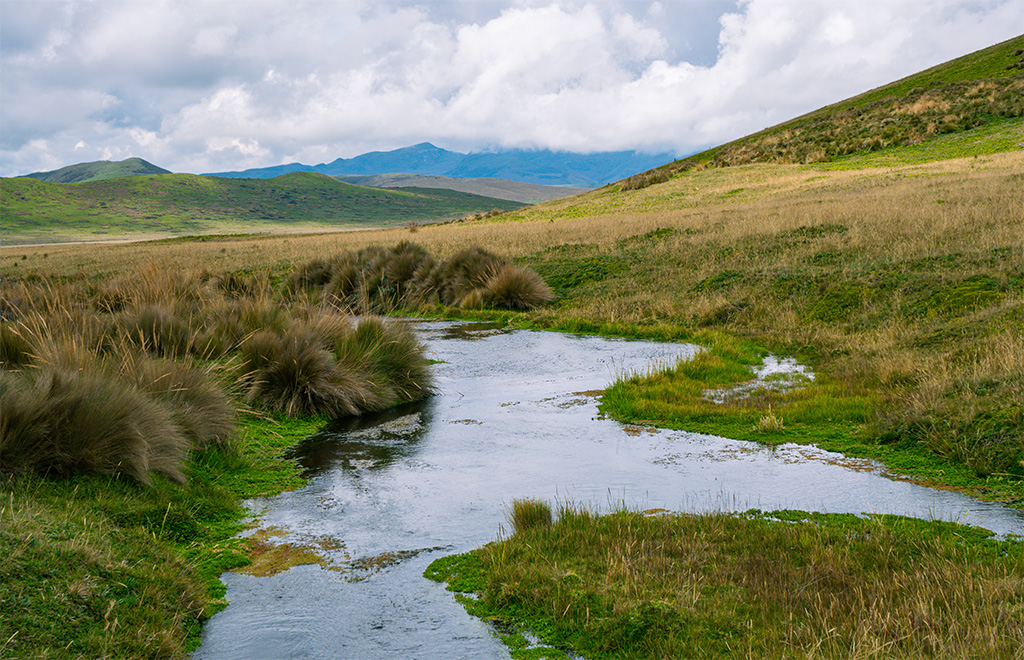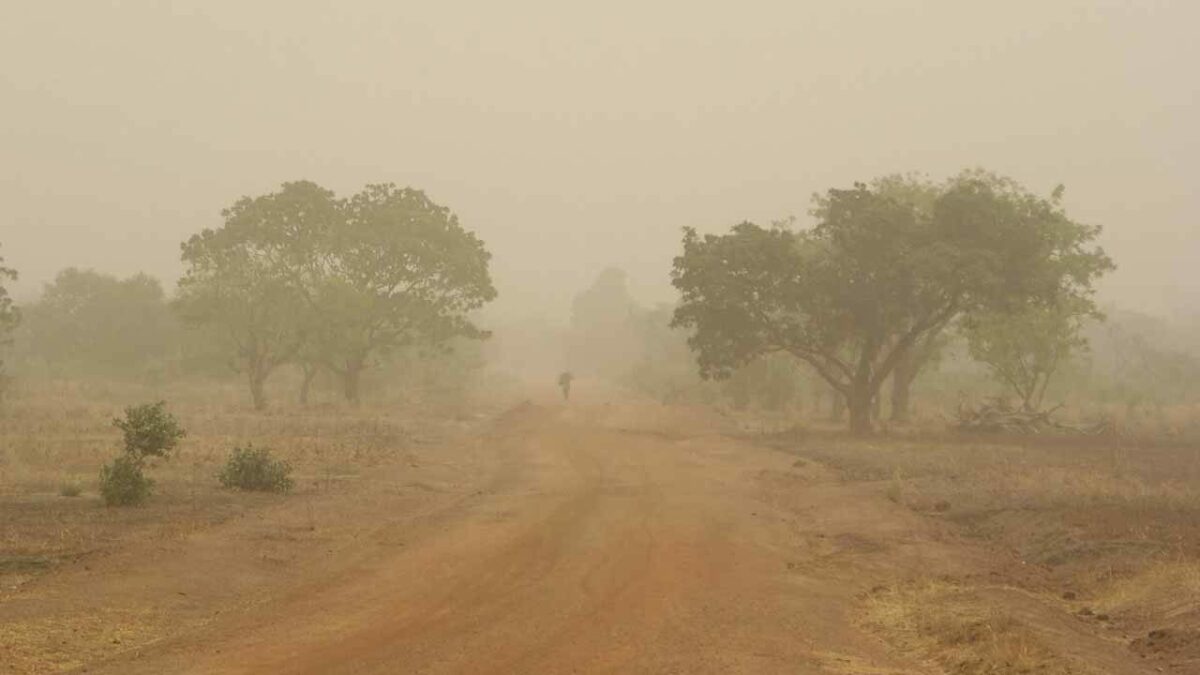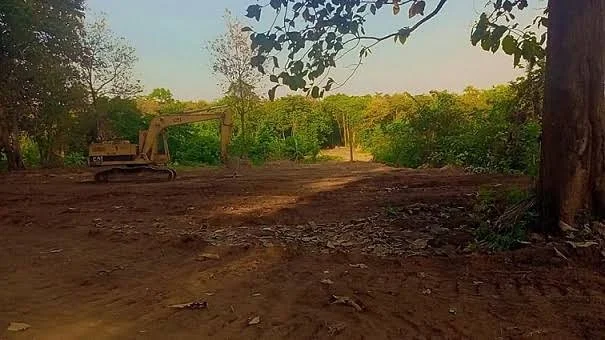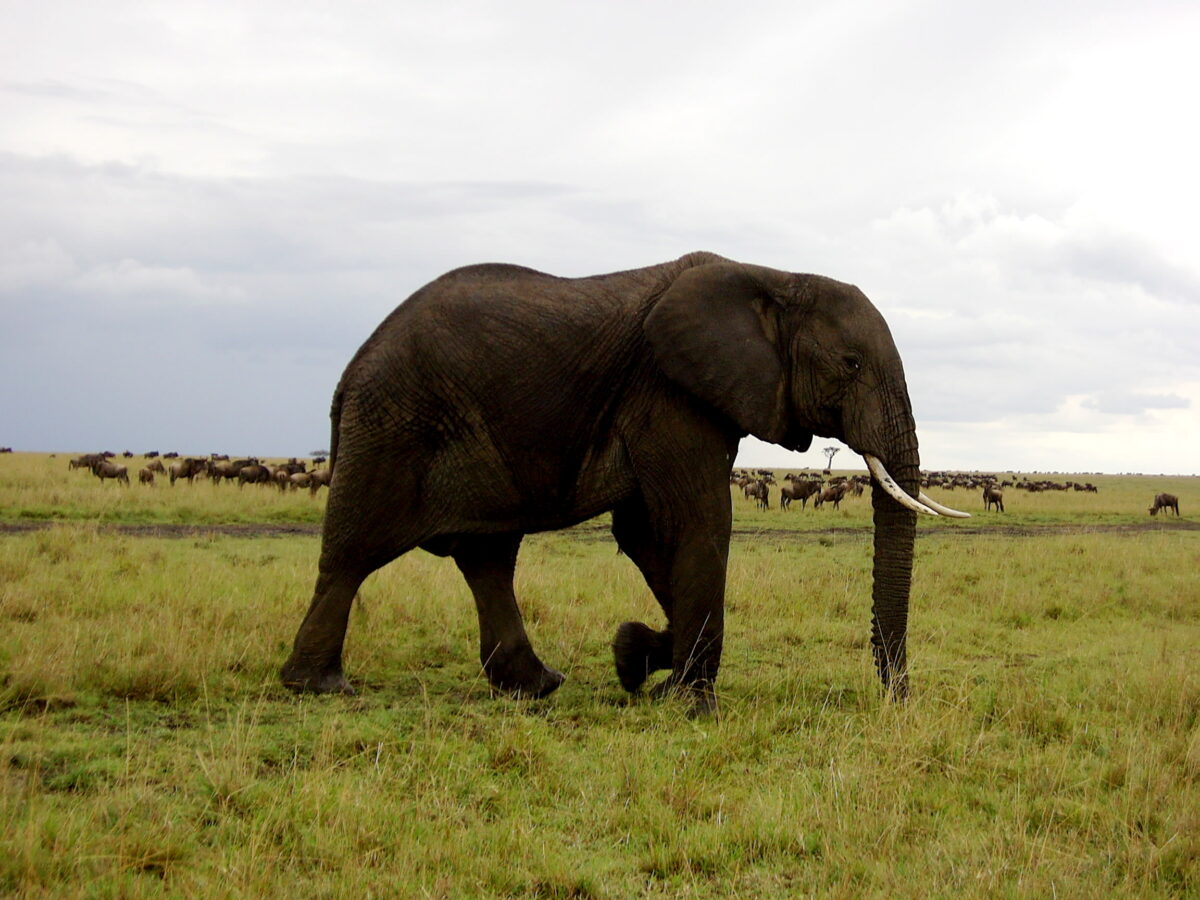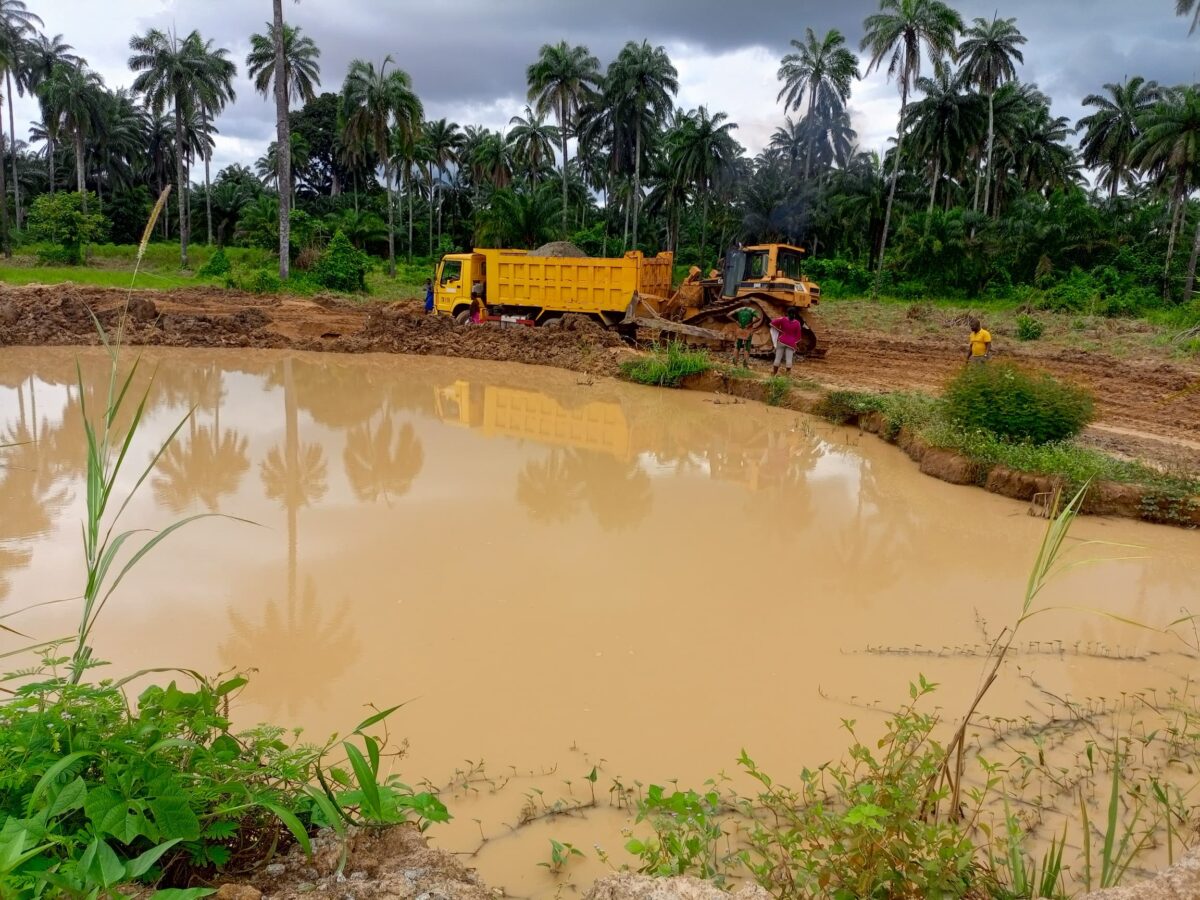When a stray elephant died last year barely 24 hours after capture by the University of Ibadan, the general response was ‘How?’. It was to find answers that I set out on a sunny Tuesday morning and almost never returned. But the answer is here, and more.
Eight cells, 16 handcuffs …
The thing about elephants: they are as smart as their size. They live in family groups and solve their own problems. By trampling forests and grasslands, they increase carbon storage and make room for smaller animals to co-exist, and they are rare in Africa now. One strayed into Gobo, a community between the Saki area of Oyo and Kwara State, Nigeria, last year and blocked a farm from the sun. First, the farm looked dark, as if it was about to rain, and then an old farmer spotted the elephant. Anyone would be scared, but this was a harmless mammoth. Villagers would offer it some leaves and it would give them its back to climb.
Children flocked around the elephant, and it walked majestically amidst them like a clown. It threw its trunk and those on its back jumped off with smiles. It wandered in the forest, and its new friends looked for it like a precious stone. Their bond grew even stronger, the children of Gobo inseparable from a 5-ton elephant, and then the worst happened: the elephant died.
It walked amidst them like a clown.
Credit: An Onigbongbo resident
THE ELEPHANT CALLED WEST
On February 1, 2022, one Adesope Habeeb Olamide, a native of Saki in Oyo State, shared a Facebook post about a strange visitor to his farm. The news was soon everywhere, and Olamide’s name was on the pages of newspapers as the first to see an elephant in Onigbongbo, a suburb of Saki. Olamide’s farm shared a boundary with River Gobo, which separates Oyo State from Kwara State, and the Kwara village on the other side derived its name from the river. It was along River Gobo that the elephant was walking on the afternoon that Olamide and his workers saw it. By this time, this reporter would learn, the elephant had spent about four months in the area.
Olamide’s post brought the elephant some fame, and then different people planned different things. The Oyo State command of the National Park Service planned to move it to the Old Oyo National Park but lacked the right equipment. On their visit to the animal in Gobo, officials of the park told Olamide that they had written to the Federal Ministry of Tourism for approval and logistics.
In Saki, young people thought that since the elephant had spent several months moving from community to community in the area, it would walk into their town some day, so they planned to put it in their state-owned Oke-Ogun Polytechnic to drive tourism. “The elephant alone can attract tourists,” Yahrobi Jeje, a community journalist and youth leader popularly called Sakilomowa in the ancient town, told me. When I asked him how young people intended to feed the large animal, Shakilomowa said every tourist would be asked to come with some fruits.
But the University of Ibadan (UI) was faster. About three teams from the university visited the Saki West Local Government chairman; one was led by Dr. Kehinde Popoola, the then director of the UI Zoological Garden. In an interview with Sakilomowa’s Saki City Updates, Engr. Omirinde Sarafadeen Ahmed, the chairman, said the teams from UI came with approval from the federal government to move the animal. The university used to have an elephant in its zoological garden, this reporter would learn, but it died several years ago. The swift moves of the school were in a bid to replace the dead elephant.
A federal government approval notwithstanding, Sarafadeen asked UI for a few things. One, the elephant would be called Saki West, Saki the surname and West the first name. The university would also build some boreholes for the local communities around River Gobo and fix some bad bridges on their roads. The parties agreed, and then UI returned with a Hiab, a 12-tyre lorry built with a crane for moving goods.
DEATH
When UI returned on Wednesday, February 16, West was at River Gobo. Despite arriving much earlier, Dr. Popoola’s team achieved little success until around 4 pm, as Gobo people would not let them take West away. Sakilomowa told me it took the intervention of the king of Gwanara, the leading Baruba town in the area, to resolve the controversy. Gobo people are Baruba, so they listened to the king of Gwanara.
For West, it was the beginning of the end. News would break the following day that it had died at UI zoo. The news was shared on Facebook by Olamide, the Saki-born farmer who first mentioned West on social media, and it spread like wildfire. Dr. Popoola also confirmed West’s death to The PUNCH. “The information (that the elephant died) is correct,” he said.
In Saki, many thought West could only have been killed. “Could the elephant have been killed because of the ivory tusk?” Olamide asked locals in a post on Facebook. Some accused Chairman Sarafadeen of selling West to UI for N15 million, Sakilomowa told me at a bar in the ancient town. He had interviewed the chairman and the latter had denied the allegation. “All this is a complete lie,” Chairman Sarafadeen said. Dr. Popoola also told journalists a postmortem had been done to ascertain the true cause of West’s death, and that its tusks had been kept in safe custody while the zoo ruminated over what to do to its remains.
“We are trying to see how we can get its bones to see whether we can do skeleton of it,” said Dr. Popoola. “That will take some time.”
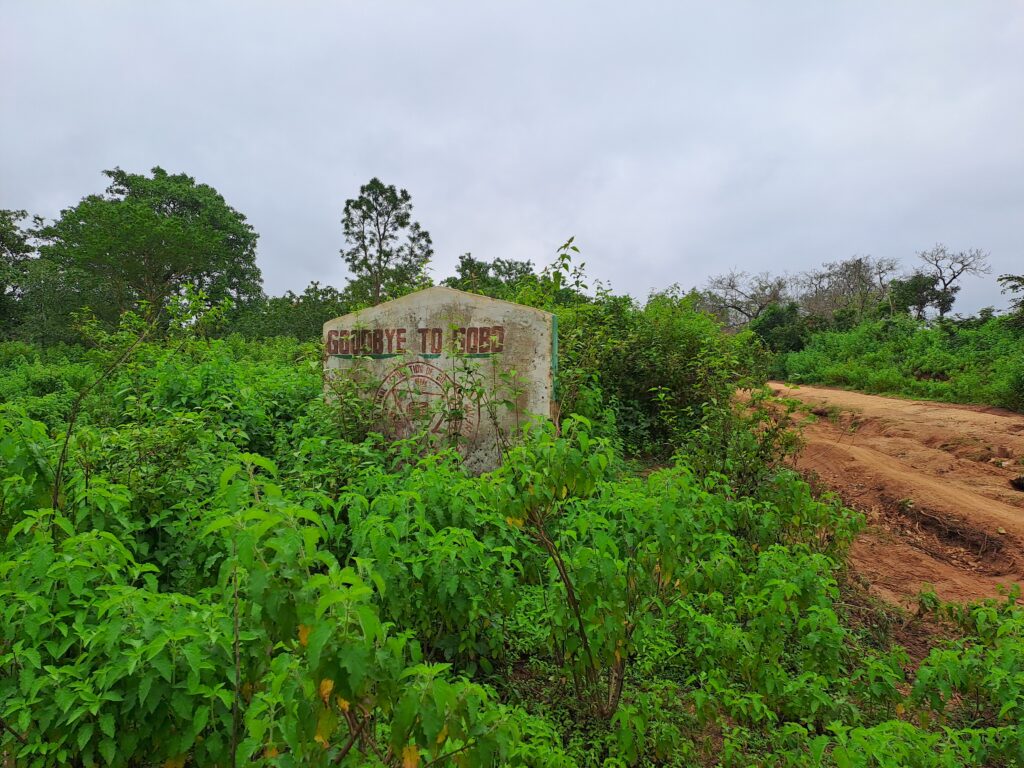
West lived several weeks in Gobo.
A SEARCH FOR ANSWERS
The thing about West: it was one of the few African forest elephants left in the wild. And for their enormous contributions to the fight against climate change, every forest elephant is worth $1.75 million, according to an article on the International Monetary Fund (IMF) website. Distinguishable by smaller ears and straighter tusks, the African forest elephant is the rarer of the two living species of indigenous African elephants. Like every other elephant, it has a big appetite. While walking through forests, it eats some small trees and step on others, leaving bigger trees with less competition and better access to water and light. These big tress then trap the carbon that could have stayed in the atmosphere to hasten climate change.
The African forest elephant’s population has dropped from about 1.1 million to about a hundred thousand, and the number continues to drop. These elephants will soon cease to exist if not handled with utmost care, so this reporter went in search of answers 18 months after UI went into silence. What killed West? But it was more than that. Shortly after fame came to West, a controversy had broken out around its origin. Some said it was from a Nigerian national park; others said it came from the nearby Republic of Benin. This was the question I asked in Gobo: where did it come from? And it led me farther north, into Gwanara town in the Baruten Local Government Area of Kwara State, where the elephant had spent weeks before moving downstream. Here, West fell trees and stepped on farms. It dipped its trunk in a canal and emptied its water at one fell swoop. But here too, West never broke into the streets; it only walked in the forests and farms, where its human friends paid him visits. It was in Gwanara that I learned that the elephant responded to French. “If you told it in French that you wanted to mount its back, it would stretch one of its legs for you to climb,” said a Baruba farmer who refused to mention his name.
When I asked the farmer where he thought the elephant came from, he pointed me towards Benin Republic. Gwanara is only a few villages from the francophone West African country. A man in the town told me he first heard of the animal in Tamira, the Nigerian side of the Benin border. He said some of his friends in the village had told him about the presence of an elephant weeks before West wandered into Gwanara.
BENIN REPUBLIC
On West’s origin, everything pointed to Benin Republic. First, the elephant responded to French, the official language of the West African country, and no other. Two, I traced the elephant’s first appearance in Nigeria to the Benin border. To respond to French, I thought, West must have interacted with humans who spoke the language, and this could only have happened with tourists in a zoo or a national park. What zoo or national park in Benin Republic is close to that part of Nigeria? I found Pendjari. I also found that the national park is home to the last population of the African forest elephant in West Africa, so I set out on a sunny Tuesday morning. I was going to see West’s relatives and ask national park officials if an elephant went missing around October 2021. I was going to ask if the park could be linked to Nigeria and trace West’s journey from home.
I arrived at Pendjari National Park around 5 pm the following Thursday exhausted, but only for a group of rangers to order me to go back at the gate. Just like that, after four hours travelling from one side of the sea to another. From Lagos to Porto Novo to Cotonou and then Parakou, I had travelled for about 14 hours, nine of it on a night bus from Benin south to north. I had travelled another six hours from Parakou to Tanguietta after sleeping a night in a hotel. I had passed Tchachou; I had passed Tcharou and about a hundred villages. I had passed Copargo where the road leads to Burkina Faso, and Natinghou dominated by Hausa from Niger. I had passed a tiny road between split rocks, with bends that could put anyone in heaven or hell; all this only to be told to “go back” without explanations. To where would I return? I had planned to spend the night in one of the national park cottages. Good hotels are as rare as hen’s teeth even in Parakou, the headquarters of the whole of Borgou District, much less here. I had told these rangers I was a tourist and journalist from Nigeria. I put on my phone camera and spoke again: is this not a tourist centre?
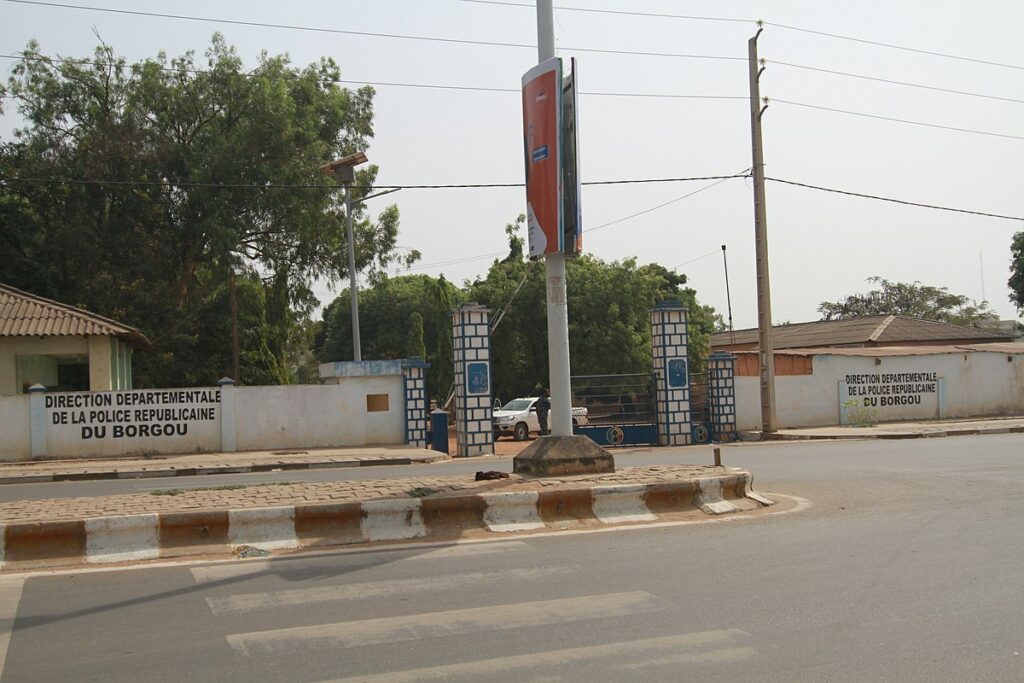
Commissariat Central Police Republicaine Parakou
Credit: Google
PRISONER
“You’re recording me!” the leader of the rangers exclaimed and then ordered my arrest. I was handcuffed immediately and led into the park. When we got to an isolated spot, they took off my shoes and searched my bag. They found only my laptop, clothes and a book. They had taken my professional ID card, ECOWAS passport and phones. They then put me in the innermost room of one of the park cottages and locked it up. It was the first of my eight cells in Benin. First, I thought it was an arrest and that more proof that I was a journalist would get me out, but now it looked like a kidnap as the rangers wouldn’t let me inform anyone of my detention. After about 30 minutes in the cell, they brought me out for a mugshot and then took me to a more isolated cell down the compound. About 30 minutes after, they would put me in a patrol Land Rover to the nearest police station. There, I made efforts to explain myself to the only officer who understood English, but he obviously wasn’t interested in my story. “Shut up!” he told me once and listened to the park officials who brought me instead.
An officer in blue uniform – I would later read his name, Kpadonou Richard, on his chest tag – wrote something down and then I was ushered into a police cell around 8 pm, a small, dark room behind a tall iron bar. In one corner was a patch of water breeding mosquitoes. Close to it was a dirty bucket that would serve as my toilet, and from somewhere between the water and the bucket oozed the smell of urine. But the first night was easy. Although the possibility of disappearing without trace had terrified me in the first moments of arrest, I had found a way to send words to my colleagues at work. When I asked to show my story pitch to that police officer, the one who told me to “shut up!”, the rangers had returned my smart phone. The policeman refused to have a look, so I quickly opened WhatsApp and sent a distress message to my organisation: “I’ve just been arrested at Pen… .” The rangers quickly came for the phone, and I couldn’t mention my exact location before pressing ‘send’. But by the time the rangers deleted the message, someone from my organisation had read it. A call came in shortly, and my captors let me answer it with the phone on loudspeaker.
As if in a hurry, the night gave way for a lonely Friday, the longest I’d ever seen. It was going to be weekend soon. If I wasn’t released today, I might spend the weekend in the cell. I paid attention to every foot sound in the station, hoping someone would open the iron door and tell me I was free again. When it was evening and nothing changed, I sensed danger. A police officer had told me on Thursday that I was looking for problem. Now it looked like I found it. Could the colleague I told on the phone that I had been arrested at Pendjari National Park have got me wrong? I thought of West, whether it could see me from wherever, whether it was proud of my efforts or it thought I had gone too far. Do they want to secretly jail me, these strange French-speaking officers who mentioned ‘prison’ at least two times on my arrest? Do they want to keep me here forever, or kill me? What do they want to do?
I ate nothing throughout Friday. Although I had no strength to sit through the night like the previous day, I stayed awake for the better part of the night. It was then that I decided to sneak one of my phones into the cell in the morning. Officer Richard had kept my two phones in my bag at the entrance of the cell, and when he brought me out earlier to wash my face, it was from the same bag that I took my toothbrush. So, the following morning, while pretending to be searching for my toothbrush, I’d sneak my small phone into my pocket and call the office on returning to the cell. The chances of doing this without being caught were slim, but it was a good risk right now. Truly, I got my smaller phone when Richard was distracted in the morning, and no one noticed it in my pocket while I washed my face and brushed my teeth. But little did I know I wouldn’t return into the same cell. Richard ordered me to wear my belt and shoes and get into the Pendjari Park Land Rover waiting outside. Where I was going and what I was going to do, I didn’t know. But I knew the phone in my pocket could put me in trouble if found. I sneaked it back into my bag before proceeding into the waiting vehicle where I would be surrounded by two armed park officials and a police officer. I asked Richard on the road, and he said I was going to Parakou.
TERRORIST
“We heard that the videos and pictures you took would be fed to terrorists,” an officer told me during interrogation at the criminal investigation department of the police in Parakou. It was scary. I’d shown him, this policeman, a journalism training certificate. I had told him my education history, my mission in his country and interest in a jolly elephant that almost spoke French. I showed him my story pitch, approval, account statement showing the receipt of the exact amount stated in my pitch and everything I thought could convince him I was a bloody journalist. I had told him how I shunned a N3,000 bribe demand to stamp my passport at a land border and opted for the sea route, how I passed through military, police and customs checkpoints, how the Nigerian immigration officer who checked my passport didn’t bother to put a stamp on it, and how the Beninese officials only searched my bag before letting me into his country.
He wrote everything down and told me to sign beside a space meant for a judicial officer’s signature. It was almost clear now that I was heading to court with terrorism charges. But that Monday was still my best day since arrest. It was my third day in Parakou and the first time a police officer really listened to me — we spoke for seven hours. When I arrived two days earlier, there were only two officers at the CID, as it was a Saturday, and they both could neither speak nor understand English. I asked for an interpreter, but they wouldn’t listen. They unsealed the letter brought with me from Pendjari and spoke to each other and to the people who brought me. They searched my phones for the pictures and videos I had taken and, after about an hour, asked that I be kept in a cell at the Parakou Central Police Station.
I couldn’t hold tears back at the entrance of this new cell. About five inmates leaned on the bar with eyes searching me as if I was a fine meal. A police officer then ordered me to take off my shirt, singlet and jeans. I had only my shorts on when he pushed me into the cell full of strange faces, where I would spend three nights. It was a typical cell with tall and stained walls. It had pavements on which prisoners could sit and sleep. Just like in Pendjari, a bucket in a corner was the toilet, and it would serve the six of us in the room. The entire floor was dirty, but it was worse and damp around the bucket, and the stench, when anyone opened the bucket, is better not described. I wouldn’t eat to avoid having any use of this toilet. When the cell got cold in the morning, I would shiver and almost fall off the pavement. And then a police officer – they are always angry – looking to mark the register would come to the bar and order everyone, “Venir (move here)!”
An inmate who had seen it all told me the Central Police Station cell was the worst in the whole of Parakou. It had better be. The only good thing about the cell was Nasiru, a Beninese who speaks about 14 African languages. At the time I got into the Parakou cell, it was not clear if anyone at work or my family knew where I was or what the police wanted to do with me. I figured an inmate could help call home on regaining freedom, so I asked if anyone understood English or Yoruba. Nasiru signified, and then we clicked. It was Nasiru, an illiterate, who memorised my friend’s phone number and informed him and FIJ of my whereabouts on regaining freedom. The only time I put something in my mouth in the three nights I spent in that cell, it was Nasiru who bought bread and persuaded me to take a cut. Though I threw the small cut away after a few difficult bites, it returned life to my ailing throat.
JOURNEY HOME
Around 10 am on Tuesday, an officer from the CID came to fetch me from the cell. “Damilola!” He called with what sounded like a friendly voice and told me to wear my clothes and shoes. He then brought a pair of handcuffs with which he would tie me to Actini, a Ghanian and fellow suspected terrorist I had shared the cell with. It was the first of the 15 pairs of handcuffs Actini and I would wear on this journey. Where we were going, we did not know yet. I thought we could be heading to the court, but when we left Parakou I thought it could be prison. Little did I know we had just started a three-day journey to the Brigade Criminelle, Cotonou, the headquarters of the Benin CID. Not that it was such a far distance; I had travelled just nine hours from Cotonou to Parakou eight days earlier. But now it was an ‘escort mission’: the Benin police lingo for transporting terrorists. Danger lights were on, the vehicle maintained a speed of between 40km/h and 60km/h and we soon drove into the Commisariat l’Arrondisement, a police station in Tchachou, a suburb of Parakou, where we were handed over to another set of officers for onward journey.
The officers in Tchachou and those after them maintained similar standards, so that by 8 pm when Actini and I were marched into a police cell near Settor to sleep, we had entered 11 police trucks and had been escorted by at least 25 police officers. One officer tied me to Actini with a pair of handcuffs and then tied us to the back of his truck with another pair. I thought I could die when the vehicle sped off and the breeze pushed my weak body against the rope. Close to Savè, a Yoruba town on the Cotonou-Parakou railway, we arrived at an accident scene. The officers conveying us picked up a bloodied corpse, dumped it at my feet and drove to the morgue from where our next police vehicle and escorts would pick us. It was a slow and torturous journey.
READ ALSO: FACT-CHECK: Force Spokesman Lied. IGP Promised to Withdraw Policemen From VIPs
On Wednesday, the journey to Cotonou continued. Although we got to the city around 9 pm after entering eight police vehicles, we didn’t arrive at the Brigade Criminelle until about 4 pm on Thursday. We were five suspects who arrived at the Brigade Criminelle from different parts of the country, and we were all locked up until officials of the Nigerian Embassy came to see me. At this time, the government of the country was under media and diplomatic pressure to release the journalist in their custody. The following morning, Actini and I were driven to court tied to each other with our 16th pair of handcuffs. We now shared the bond of friends, Actini and I. Together we had stepped into 25 police vehicles. Together we had stepped into different police cells and seen hell in Benin. When it began to look like I could regain freedom, Actini told me: “Don’t leave me [here]’. From his looks, he is a young man in his early twenties, and from his explanations, he was innocent too. But while I regained freedom after appearing before the prosecutor between two daredevil Nigerian Embassy officials supported by a lawyer, Actini ended up in prison.
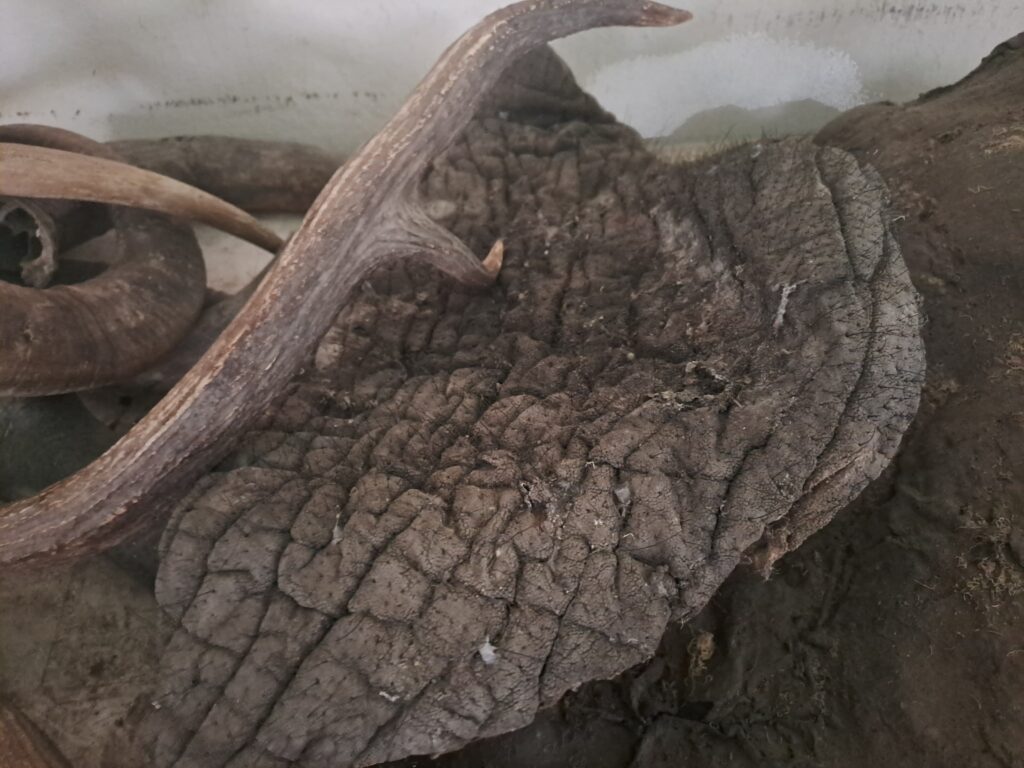
All that is left of West in UI is a small fraction of its skin, which is embalmed and feels like a rock.
WHAT KILLED WEST? STRESS?
Before Benin Republic, I was at UI zoo hoping to find what killed West. Sensing the possibility of information blackout, I visited first as a tourist. And information was truly scarce on my return the following week as a journalist. The zoo curator spoke with me first; he said he wasn’t willing to talk about that elephant. Two assistants of Dr. Henrietta Awobode, the current director of the zoo, said she would be available soon, so I waited a few hours in her office. When she had not arrived at noon, I placed a call through and she refused to comment on West. Instead, she advised I meet Prof Kayode Adebowale, the university’s vice chancellor. At the vice chancellor’s office, an assistant said it was disrespectful that the director sent me to the highest ranking officer in the school just like that. I placed several calls to Dr Popoola, the man who spearheaded West’s capture, but he wouldn’t answer any, and to my messages, he gave no response. But I’d got some secrets on my first visit. An official who saw West a few moments before death told me it died of stress. By the time the animal got to UI zoo on the morning of February 17, the official said, it was already so weak that everyone knew it would die. “On that day, even I cried.”
In fairness, translocation can be stressful for elephants, as they are first sedated and then hoisted upside down onto a vehicle. But experts know to minimise the stress. How do you move an elephant? The International Fund for Animal Welfare (IFAW), which translocated 263 elephants in Malawi in 2022, says this: “On the day of the move, we quickly dart entire family herds to sedate them. A skilled team of veterinary support staff performs health checks, while researchers record data about the captured elephants. … One at a time, staff members attach straps to the elephant’s legs, do a last health check, and lift the elephant into a waiting trailer with a crane. From capture to trailer, the whole process is over in about 20 minutes.”
Clearly, West experienced long-term stress. Rather than lift the poor animal into a waiting crate or trailer, the UI team dropped it on a Hiab, where it remained in the upside-down position long enough for people to pose with and take pictures. Rather than straps, the UI team lifted West with chains. IFAW would reverse the sedative given to a captured elephant on getting it into a trailer. But if UI did the same for West and it regained consciousness, it could mean even more stress as it would be transported on the back of a Hiab for several hours. And there was something about sedatives during West’s capture. The UI went with a bag of fruits and yam poisoned with sedatives, FIJ learned from multiple sources. When West ate all and refused to sleep, the team started shooting darts. The first dart that landed on the elephant seemed to make no impact, so they fired another shot, and then the 5-ton elephant fell, almost inside River Gobo.
The symptoms of an overdose of sedatives on animals are consistent with the descriptions of two people who saw West moments before death. West was so weak that its appearance scared one official. Also, in his interview with Saki City Updates, Chairman Sarafadeen said Dr. Popoola told him moments before West’s death that its breathing had changed. These are two of the common symptoms of an overdose of sedatives in animals: weakness and slow respiratory rate.
FIJ also penetrated the UI Zoological Garden Museum where West’s remains and essential body parts could have been kept. There was the preserved body of Imade, an ape who died aged 36, and Haruna, who died at 49. There was a giant tortoise who lived for 126 years, but no preserved skeleton of West as suggested by Dr. Popoola. An official of the zoo said they could not get to the skeleton because of the amount of fat in elephants. Also, West’s tusks were not in the museum. FIJ learned that they were handed over to the federal government at the height of the controversies around the animal’s death. All that is left of West in UI is a small fraction of its skin, which is embalmed and feels like a rock.
Intro inspired by Olatunji OLOLADE
Subscribe
Be the first to receive special investigative reports and features in your inbox.


